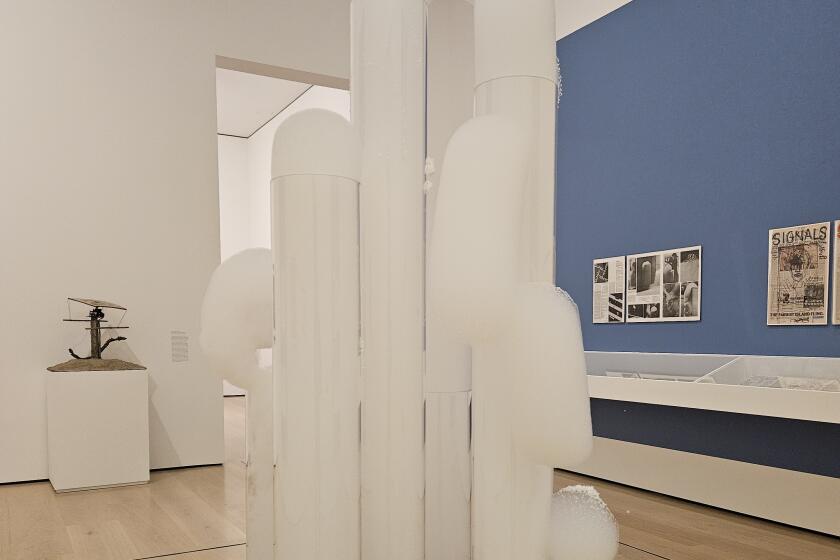‘Corpus Christi’ Opens in a Storm
Is “Corpus Christi” more blasphemous than “Jesus Christ Superstar”? Is it less pious than “Godspell”? If the Jesus-like character in Terrence McNally’s new passion play had been re-imagined as a punk or a woman or just about anything but a gay man, would the relatively gentle play have had to open at the Manhattan Theatre Club Tuesday night in the atmosphere of a war zone? Would there be metal detectors at the doors, protesters outside, bomb and death threats hanging in the air with the ugliness of a gay Wyoming college student left for dead on a country fence like a scarecrow--or, if you prefer, like a more universal symbol of martyrdom?
Since this review went to press before Tuesday night’s official opening, we can only guess--not to mention hope--that nothing beyond philosophical disagreements resulted from the expected massive face-off between religious groups and First Amendment supporters. On the basis of Sunday’s preview, however, it is impossible to imagine that the torture last week and the death Monday of Matthew Shepard, a young man in a small Western town, was not on the minds of everyone pumped up--on one side or the other--about McNally’s surprisingly personal, almost chaste retelling of the most famous hate crime ever told.
In a less overheated atmosphere, on a less polarized day, “Corpus Christi” would probably have been allowed to be what it is: a beautifully staged, disarmingly performed, often witty, sometimes merely jokey, but ultimately earnest and predictable play with little beyond the obvious on its intellectual plate. As a drama, its biggest danger is being overly pious, overly reverent and tied to the inevitable outlines of the story. It is less rude and outrageous than Christopher Durang’s ‘70s satire of religious hypocrisy, “Sister Mary Ignatius Explains It All to You” and, to anyone who has lived in the free world for the past half century, it should be about as threatening as a hootenanny.
But, yes, this messiah is gay. He is called Joshua (Anson Mount) because, as his Texas mother says, “Jesus sounds like a Mexican.” Like McNally, he was born and raised in the small Texas town of Corpus Christi, where, as the multi-award-winning playwright apparently remembers it, high school boys amused themselves by trying to stuff a gay boy’s head in the toilet. Judas (Josh Lucas, looking especially satanic) ingratiates himself by chasing the rednecks away. Yes, there is a kiss, a reference to sex with disciples and some “wonderful Saturday nights,” though Joshua always warns the men that physical intimacy will never really go deeper than his body.
The production has been staged with amazing depth and imagination by Joe Mantello, who, one can hardly remember, was a beginning director when he recently did McNally’s “Love! Valour! Compassion!” with the same design team in this same theater. Everything seems aimed at reminding us that this is a ritual, a piece of theater and not an attempt to tell a real story. The proscenium wings are gone and the stage has been stripped to the back wall (by designer Loy Arcenas). One of the 13 actors--all new, young faces, all wonderful--begins with the ancient pounding of a wooden pole. The men begin in street clothes, then change into white shirts and khakis (by Jess Goldstein) to play multiple roles.
A speaker is chosen through a game of spin the bottle. “We are going to tell you an old and familiar story,” he says to us, “one you believe or you don’t. There is no suspense, few surprises. The playwright asks your indulgence as do we, the actors. There is no trick up our sleeves, no malice in our hearts. We’re glad you’re here.”
*
Thus, with an almost heartbreaking defensiveness, the baptism begins. We meet the actors who become the disciples, a ceremony that veers violently between the gooey sentimentality of a love-in and ingratiating comments from the actors about their characters. There is an occasional song, with a couple of onstage violins and sometimes a hymn in lovely harmonies. The nativity scene begins as a comic sketch, with Mary and Joseph finding shelter in a heehaw motel and Magi gifts that include a box of cigars and a sled.
But there are rough sex noises in the room next door, and the screams of a battered woman, which foreshadow the meanness and empathy to follow. A God figure appears cross-legged in light beams to warn Joshua of his destiny. As he grows up, he hears hammering. “Of course you hear hammering,” says Mary. “Your father’s a carpenter.”
Thus, there are moments of real humor, endearing silliness and some unworthy foolishness, but also ones that are enormously touching. Mantello’s direction is especially impressive in scenes from Pontius Pilate High School, in sweet miracles and in blending images of small-town Texas and Rome.
Eventually, though, events lead to what they lead to, including a crucifixion with Joshua, as “King of the Queers,” smeared with lipstick. The cast returns to explain again, that “maybe other people have told the story better,” and explain that no offense was intended. We keep wondering if this would have been a better play if the threats had not frightened everyone. Someone, early on, talks about the “unwilling suspension of disbelief.” Too safe to be major theater, too scary for some of the religious, the play hangs there, suspended, among metaphor, misunderstanding and noise.
* “Corpus Christi,” Manhattan Theatre Club, 131 W. 55th St., New York. (212) 581-1212.
More to Read
The biggest entertainment stories
Get our big stories about Hollywood, film, television, music, arts, culture and more right in your inbox as soon as they publish.
You may occasionally receive promotional content from the Los Angeles Times.






